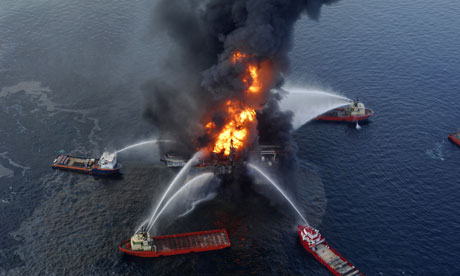
guardian.co.uk, Saturday 8 May 2010 13.36 BST
The deadly blast on board the Deepwater Horizon oil rig in the Gulf of Mexico was triggered by a bubble of methane gas, an investigation by BP has revealed.The deadly explosion caused 3 million gallons of crude oil to pour into the Gulf. Photograph: KPA/Zuma/Rex Features
A report into last month's blast said the gas escaped from the oil well and shot up the drill column, expanding quickly as it burst through several seals and barriers before exploding.
The sequence of events, described in the interviews with rig workers, provides the most detailed account of the blast that killed 11 workers and led to more than 3 million gallons of crude oil pouring into the Gulf.
Segments of the interviews conducted during BP's internal investigation were described in detail to the Associated Press by Robert Bea, a University of California Berkeley engineering professor who serves on a National Academy of Engineering panel on oil pipeline safety. He also worked for BP as a risk assessment consultant
during the 1990s. He received the details from industry friends seeking his expert opinion.
The revelations came as a giant funnel was lowered over the oil well in a bid to contain oil leaking from it.
BP said it may take up to 12 hours for the 98-tonne, steel and concrete containment device to settle in place almost 1 mile (1.6km) below the surface. The company added that the operation appeared to be going as planned.
If the procedure is successful, the device will hoover up 85% of the oil gushing from the ocean floor and pipe it into a waiting tanker. But BP admits it is unclear whether its efforts will work. No containment box, or cofferdam, has ever been deployed at such depths, and the operation is threatened by frigid ocean temperatures and the immense pressures. Meanwhile, crews have begun to drill a relief well, but that could take months.
The outcome of the efforts to contain the oil could be critical to the future of offshore drilling in America. The Obama administration yesterday suspended new offshore drilling in Alaska and Virginia.
BP faces an equally daunting challenge to contain the political and financial fallout from the spill. The Obama administration has kept up the pressure on the oil giant, a move seen in part as a tactic to divert criticism of its own role in the disaster.
Recent news reports have suggested the interior department exercised lax oversight in approving BP's operations in the Gulf, accepting too readily its claims there was little risk of an accident.
No comments:
Post a Comment